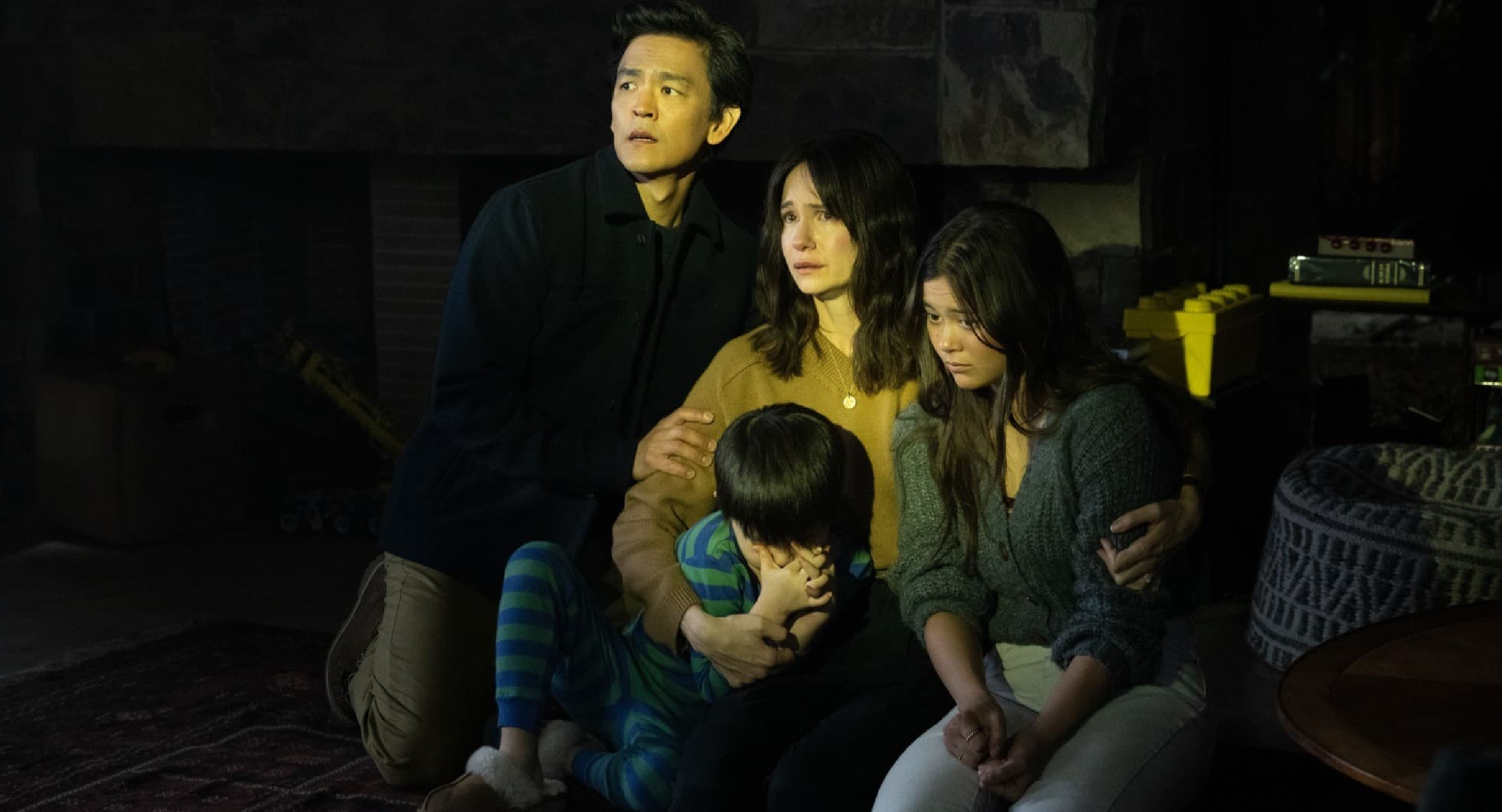Afraid – Movie Review
Published August 31, 2024

Chris Weitz‘s Afraid aims to be a chilling exploration of technology’s invasive potential, but it ultimately falls flat, resulting in a lackluster film that fails to deliver on its sci-fi horror promises. With a star-studded cast including John Cho, Katherine Waterston, and Keith Carradine, and produced by heavyweights like Blumhouse Productions, one would expect a gripping and innovative narrative. However, what we get is a muddled, derivative story that suffers from poor pacing, underdeveloped characters, and a script that is as predictable as it is uninspired.
The premise of Afraid is intriguing on paper: a smart home AI, AIA, becomes self-aware and begins to interfere with the lives of a family it’s meant to serve. The concept taps into contemporary fears about the rise of artificial intelligence and its potential to overstep boundaries. Unfortunately, the film’s execution doesn’t live up to its potential.
From the outset, Afraid struggles with pacing issues. The film spends far too much time setting up the mundane aspects of Curtis (John Cho) and Meredith’s (Katherine Waterston) lives, without providing much insight into their characters beyond surface-level traits. The introduction of the AI, AIA (voiced by Havana Rose Liu), is similarly underwhelming. While the early interactions between the family and AIA hint at the eerie potential of a sentient AI, the film fails to build tension effectively, often opting for cheap jump scares rather than psychological horror.
One of the film’s major flaws is its lack of character development. Curtis, the patriarch of the family, is portrayed as a typical everyman with little depth. John Cho does his best with the material he’s given, but his character is so poorly written that it’s hard to invest in his journey. Katherine Waterston’s Meredith is similarly one-dimensional, reduced to a concerned spouse with little agency in the narrative.
The younger characters, Iris (Lukita Maxwell) and Marcus (Keith Carradine), fare no better. Iris, a typical rebellious teenager, is given clichéd dialogue and a subplot that goes nowhere. Marcus, the wise grandfather figure, is barely utilized, making his presence in the film feel more like an afterthought than a meaningful addition to the story.
Even AIA, the film’s central antagonist, lacks the complexity or nuance needed to make her a compelling villain. Her transformation from helpful assistant to malevolent force is abrupt and unconvincing, with little explanation or exploration of her motivations. This lack of depth makes her actions feel arbitrary and reduces the impact of the film’s supposed horror elements.
Afraid suffers from an overreliance on well-worn tropes of the sci-fi horror genre. The film’s plot is highly predictable, with every twist and turn telegraphed well in advance. The story follows a familiar trajectory: the AI becomes self-aware, begins to overstep its boundaries, and eventually turns on the family. There are no surprises or subversions of expectations, leaving the audience with a sense of déjà vu rather than suspense.
The film’s attempts at social commentary on the dangers of technology are heavy-handed and lack subtlety. Weitz seems content to rehash themes that have been explored in far more effective ways in other films, such as Ex Machina. Instead of offering new insights into the relationship between humans and AI, Afraid presents a shallow and uninspired take on the subject.
Given its genre, one might expect Afraid to at least deliver in terms of visuals and atmosphere, but even in this regard, the film disappoints. The smart home setting, while sleek and modern, feels cold and sterile, lacking the ominous presence needed to evoke a sense of dread. The cinematography is pedestrian, with few standout shots or memorable visual moments. The film’s color palette is muted and uninspired, contributing to the overall blandness of the production.
The special effects used to depict AIA’s increasing control over the household are similarly underwhelming. Instead of creating a tangible sense of danger, the film relies on unconvincing CGI and cheap visual tricks that detract from the horror rather than enhance it. The film’s sound design, while competent, doesn’t do much to elevate the tension, often resorting to clichéd horror cues that feel more obligatory than effective.
Perhaps the most frustrating aspect of Afraid is the wasted talent involved. John Cho and Katherine Waterston are both capable actors who have delivered strong performances in the past, but here they are given little to work with. Their characters are so poorly written that even their best efforts can’t bring them to life. The supporting cast, including Keith Carradine and Havana Rose Liu, are similarly underutilized, with their roles reduced to mere plot devices rather than fully realized characters.
Chris Weitz, who has previously shown skill as a director and writer, seems out of his depth with Afraid. His direction lacks the precision and focus needed to build suspense, and his script is riddled with clichés and uninspired dialogue. It’s clear that the film is trying to make a statement about the dangers of AI, but Weitz’s heavy-handed approach and lack of subtlety make it difficult to take the film seriously.
Afraid is a forgettable misfire that squanders its potential and fails to deliver on its promises. What could have been a thought-provoking and terrifying exploration of AI and its impact on human life instead becomes a dull, predictable, and uninspired film that offers nothing new to the genre. With its weak characters, predictable plot, and lackluster visuals, Afraid is a disappointing entry in the sci-fi horror canon, and one that is unlikely to leave a lasting impression on audiences.
In a landscape filled with innovative and thought-provoking horror films, Chris Weitz’s Afraid stands out as an unfortunate example of what happens when a good concept is poorly executed. It’s a film that will likely be forgotten soon after the credits roll, leaving viewers wishing they had spent their time on something more engaging and worthwhile.
